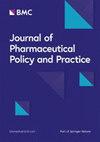评估希腊药剂师对坚持用药的态度和障碍
IF 3.3
Q1 HEALTH POLICY & SERVICES
Journal of Pharmaceutical Policy and Practice
Pub Date : 2024-05-22
DOI:10.1080/20523211.2024.2319746
引用次数: 0
摘要
摘要 坚持用药是取得持续良好临床效果的一个不可或缺的方面。了解药剂师的看法和态度以及存在的障碍对于提高患者的依从性至关重要。这就是本研究的目标。研究方法 向 280 名社区药剂师样本发送了一份经过验证的调查问卷。通过电子邮件和电话通知了药剂师。回复率为 55%。结果 大多数药剂师都认为,识别患者未达到最佳依从性属于他们的职业责任,他们也参与了促进患者依从性的活动。有证据表明,最受欢迎的干预措施是自我管理和间接方法。具体工具的使用程度较低。最后,目前的研究表明,最常见的障碍是患者在坚持用药方面偏好医生、缺乏来自患者的信息以及缺乏时间。结论 虽然药剂师在坚持用药方面的重要作用已得到确认,但在药剂师用于控制和促进坚持用药的工具方面,以及在药剂师自身和患者面临的障碍方面,发现了明显的差异。干预措施应更加一致,医护人员之间的合作理念应得到培养。本文章由计算机程序翻译,如有差异,请以英文原文为准。
Evaluating Greek pharmacists’ attitudes and barriers regarding medicines adherence
ABSTRACT Adherence constitutes an integral aspect of achieving consistently good clinical results. Understanding pharmacists’ perceptions and attitudes, along with existing barriers is essential on the roadmap of enhancing patient adherence. This constitutes the goal of this study. Methodology A validated questionnaire was sent to a sample of 280 community pharmacists. Pharmacists were notified both by email and telephone. A response rate of 55% was achieved. Results Most pharmacists agree that the identification of patients’ suboptimal adherence falls under their professional responsibility and they engage in activities to promote it. There is evidence to support that the most popular interventions were self-management and indirect methods. Specific tools were used to a lesser degree. Finally, the current study illustrated that the most commonly identified barriers were the preference of patients for physicians regarding adherence, lack of information from patients and lack of time. Conclusion Although the important role of pharmacists in adherence is ascertained, significant discrepancies in the tools used to control and promote adherence among pharmacists were identified, and also in obstacles faced by themselves and their patients. The interventions should be more consistent and the notion of cooperation among health care professionals should be nurtured.
求助全文
通过发布文献求助,成功后即可免费获取论文全文。
去求助
来源期刊

Journal of Pharmaceutical Policy and Practice
Health Professions-Pharmacy
CiteScore
4.70
自引率
9.50%
发文量
81
审稿时长
14 weeks
 求助内容:
求助内容: 应助结果提醒方式:
应助结果提醒方式:


